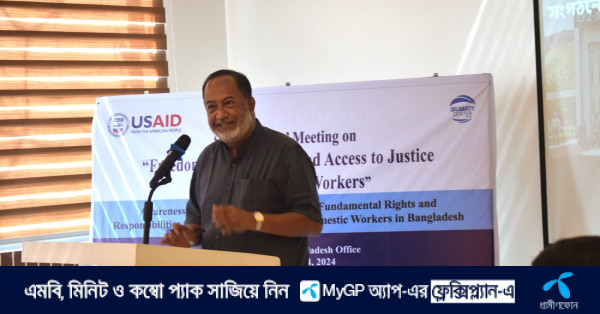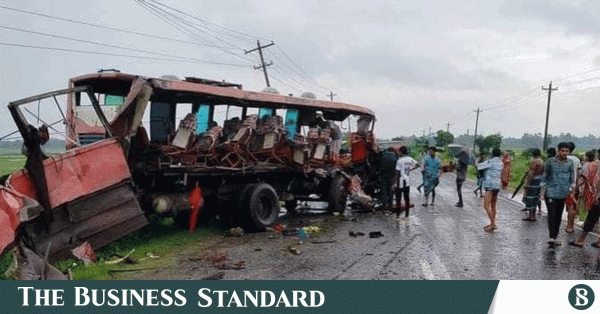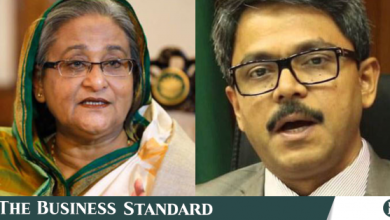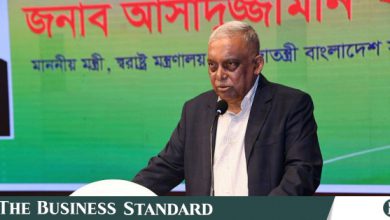Speakers call for union rights, collective bargaining in EPZs


“Freedom of Association and Access to Justice: Rights of EPZ Workers” event held on 24 Sep in Gulshan. Photo: UNB
“>
“Freedom of Association and Access to Justice: Rights of EPZ Workers” event held on 24 Sep in Gulshan. Photo: UNB
Labour leaders and advocates on Tuesday demanded the right to form unions and engage in collective bargaining for workers in Bangladesh’s Export Processing Zones (EPZs).
They urged for a revision of the Bangladesh EPZ Labor Act, 2019, calling for amendments to address these critical labour issues at an event, titled “Freedom of Association and Access to Justice: Rights of EPZ Workers,” at a city hotel in Gulshan.
Organised by the Solidarity Center’s Bangladesh office (SC-B) under the USAID-funded Global Labour Programme, the discussion highlighted how the current EPZ labour law deprives workers of key labour rights, creating significant disparities between EPZ workers and their peers outside the zones.
Md Asadul Hoq, president of the Workers Welfare Association at Queen South Tex Mills Ltd in Savar, criticised the restrictions imposed on EPZ workers.
“Our place of work is more like a jail,” Hoq said, referring to the provision that prevents EPZ workers from joining external organisations.
“How are we expected to know about our rights and the way of the world if we cannot get in touch with other organisations?” he said, adding that workers who try to speak out live in constant fear of losing their jobs.
The Bangladesh Export Processing Zone Authority (BEPZA) data shows that approximately 516,588 workers are employed in EPZs, with women making up 66 percent of the workforce. In the fiscal year 2021-2022, exports from EPZs amounted to $8.5 billion, with 54 percent coming from the garment sector alone.
Golam Quibria, a programme officer at Solidarity Center, presented the keynote paper, which pointed out the EPZ law’s failure to protect workers’ rights to freedom of association.
He emphasised that the absence of an effective judicial system to enforce these rights leaves workers vulnerable.
Monika Hartsel, deputy country director of SC-B, in her opening remarks, noted, “None of these are new issues, but we are facing a new moment with emerging opportunities. With recent changes in Bangladesh, it’s crucial to address EPZ workers’ rights to align with international standards, especially on freedom of association.”
The discussion also delved into the limitations of the current legal framework. Advocate Salim Ahsan Khan remarked, “While the EPZ Act allows for the formation of Workers Welfare Associations (WWAs), these associations are prohibited from connecting with NGOs, trade unions, or federations outside the EPZs. Workers are also restricted from communicating with external organisations, severely limiting their ability to seek redress for labour rights violations.”
SC-B Country Programme Director AKM Nasim underscored the challenges faced by EPZ workers. “Although the EPZ Labor Act permits Workers Welfare Associations, their rights are further restricted by various subtle obstacles imposed by BEPZA. EPZ workers must be allowed to connect with workers’ rights organisations to enhance their knowledge and capacity to exercise their freedom of association rights.”
Nasim further highlighted that access to justice for EPZ workers is extremely limited, even compared to the minimal provisions under the Bangladesh Labour Act of 2006. He called for a comprehensive review and urgent amendment of the EPZ Labor Act.
The discussion featured prominent labour leaders, including Bangladesh Revolutionary Garments Workers Federation president Salauddin Shapon, Bangladesh Independent Garment Workers Union Federation general secretary Rashadul Alam Raju, and several others. Garment factory owners and government representatives also attended the event, which echoed the need for immediate action to address these labour concerns.




